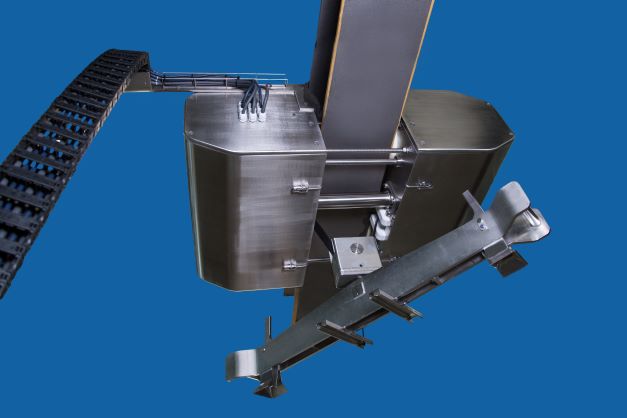Almost all delivered cranes are specifically adapted to individual conditions on site. molkerei-industrie looked around at Altmann.
Since 2001, the cranes for the dairy and cheese making industry have been further perfected, explains co-owner Robert Altmann. This applies to the construction as well as to the material. "The material of choice is always stainless steel 1.4571, as it is considerably more acid-resistant," explains Altmann. "Of course, this material is more expensive because its processing is more complex. But this is the only way to achieve operating times of up to 30 years. If customary steel were used, a maximum life of 5 years would be given in a salt bath environment. And only if the operator constantly takes care of extensive maintenance. If rust gets into the material at the end, a contamination of the product can no longer be prevented". On the one hand, the chlorides in the salt bath are strong causes of corrosion, but the cleaning agents are more dangerous, says Altmann. If these are not correctly dosed and used, even stainless steel will not last long.
Tailored to be free from contamination
But it is not just the steel used that matters, it all depends mainly on the construction. Only completely encased engine gearbox blocks prevent any leakage of lubricants. Altmann has developed a modular system for this, which guarantees the user the highest level of safety. And that even with 24/7/365 operation. Altmann can now also supply systems for cleanroom environments in the semiconductor industry that cannot tolerate the slightest material contamination. At this point, as in the food industry, particular attention must be paid to wear. Smooth, cleanable surfaces, encapsulation and above all the choice of load-bearing elements are decisive factors. For the latter, Altmann often advises belts that are suitable for use with foodstuffs, in which a plastic coating surrounds the metal belt that is actually responsible for absorbing the force. Conventional load-bearing elements such as chains or wire ropes must be lubricated every day if they are used in a salt bath ...
Altmann generally sees plastic as an important alternative to metal. Special plastics can withstand high forces, tend to have little wear and impress with their resilience properties after deformation during force absorption. The company manufactures its own gear wheels, made of metal and plastic, or in hybrid combinations. This means that there is absolute control over materials, their properties and suitability for the intended use.
The Albaching plant not only works with an unusually high production depth, the peripherals such as electronics and programming are handled independently and in-house as well. The same applies to assembly and commissioning as well as the static calculations in advance. Commissioning is made easier for the customer by the fact that Altmann, which is completely unusual for a crane manufacturer, has set up its own test stand in the factory, which every crane system has to pass before delivery. Precondition for their flawless work is always the exact constructive coordination with the spatial conditions on site. Recently, Altmann started recording this with a 3D laser scanner.
Automation has the potential
Robert Altmann sees enormous development potential in automation: "There is a shortage of personnel everywhere. In internal logistics, our systems can provide a remedy and also eliminate the human uncertainty factor". This remedy must, however, be designed in such a way that it does not become a problem itself, for example by causing loads to swing. These effects can be seen in many salt baths in chipped areas. Altmann: "When lifting and transporting everything has to be done quickly.
Experienced staff can protect against damage to a certain extent, but our pendulum damping works safer and gentler than a human could".With the pendulum damping, the operator can specify the parking positions via a display, which can then be approached precisely and, above all, quickly.
Despite Corona and a shortage of raw materials, Altmann can still maintain its project lead times of 16 weeks. This is made possible by a high stock level compared to the industry standard.

Robert Altmann: We have set up a test stand that each of our cranes must pass before delivery.

Hygienic belt hoist with cover optionally made of stainless steel or plastic.
International DAIRY September/October 2021- page 16:https://international-dairy.com/wp-content/uploads/epaper/1000024506/IDM_09_2021_Dairy_Alternatives/page_16.html